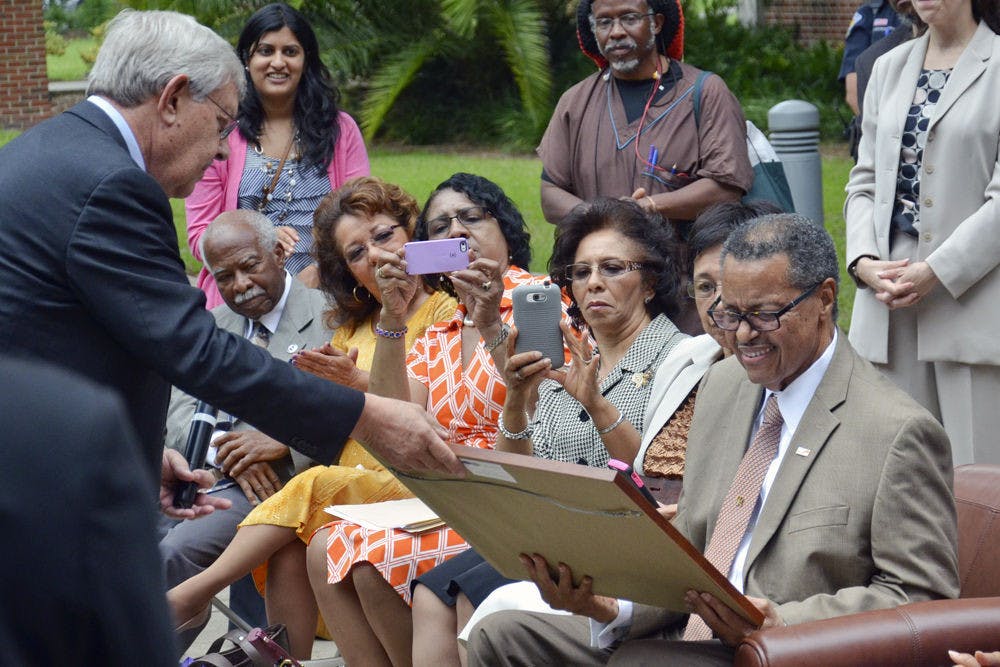After spending more than 30 years working as a judicial assistant for Judge Stephan Mickle, Rebecca Butler struggled to put into words what he meant to her and others who adored him.
As three decades of memories washed over her, she recounted the day they met in 1983 during her job interview when Mickle was an Alachua County judge. She said he was calm and humble. He hired her on the spot.
“He was a gentle giant,” Butler, 66, said. “He’s molded and shaped my life in many ways. I will always be grateful for his wisdom and guidance.”
Mickle, the first Black student to earn an undergraduate degree from UF in 1965, died of cancer Jan. 26. He was 76.
He began his college career at Bethune-Cookman University in Daytona Beach before transferring to UF in 1962. W. George Allen, who then went on to be the first Black graduate of UF Levin College of Law, ultimately convinced him to transfer.
Being among the first seven Black students to attend UF was not an easy feat for Mickle, and he struggled to find a sense of belonging.
“I remember discussing with my father whether I should put a Florida sticker on our car for fear that some redneck or racist might throw a brick through the window,” Mickle said in a 1995 interview with the UF Samuel Proctor Oral History Program. “Gainesville was still a very segregated, small, close-minded town back in the 1960s.”
UF was quietly integrated, Mickle said. Former Gov. Farris Bryant, a conservative segregationist, urged former UF President J. Wayne Reitz to keep their Black students a secret — the most publicity they got at the time was an inch-long blurb in a St. Petersburg newspaper.
Midori Lowry, Mickle's former law clerk of 16 years, remembers Mickle once told her that while at UF, the only time he spoke most days was when professors called attendance.
“There's a lot of pressure to be the first,” Lowry said. “Because if you're the first and you're not successful, that's an excuse for saying: ‘Well, why should we let anyone else?’”
Following graduation, Mickle became the first Black person to establish a law practice in Gainesville and the county’s first Black county judge in 1979. In 1993, he began serving as the first Black federal judge in the First District Court of Appeal.
Mickle was nominated by former President Bill Clinton and unanimously approved to assume a federal judgeship in the U.S. District Court at the Northern District of Florida in 1998.
Aside from his career on the bench, Lowry said Mickle was known as a family man. She remembers when Mickle let a lawyer leave a deliberation early so he could make it to his child’s second-grade play.
“It was a very wholesome environment in chambers,” Lowry said. “Family was important to him.”
Butler said when her mother was ill, he made sure she could go see her.
“He said ‘Rebecca, go see about your mother. Family comes first,’” Butler said.
Kenneth Nunn, a UF law professor, remembers Mickle as a trailblazer for Black people in the legal field.
“He opened doors to arenas that were not, prior to his coming, known to be open to people who look like him,” Nunn said. “He would walk into these arenas, and be just as calm, competent and capable as anybody else.”
UF Levin College of Law Dean Laura Rosenbury said she’s proud to have Mickle’s portrait hanging in the Martin H. Levin Advocacy Center.
It’s only been 62 years since Mickle walked onto campus as a student for the first time. Rosenbury said she can’t begin to imagine what that must have been like.
“He had to constantly be the first,” Rosenbury said. “That took incredible strength and persistence. He was always focused on creating a pathway for future African American students.”
University administration, faculty, staff and students are saddened by the loss of Judge Mickle. UF President Fuchs said Mickle’s legacy cannot be overstated.
“We are thankful for the power and permanence of his example, from his courageous barrier breaking to his exceptional legal career,” Fuchs wrote in an email. “He is a model not just for our law students, but for everyone in our university community.”
Contact Alan Halaly at ahalaly@alligator.org. Follow him on Twitter @AlanHalaly.

Alan Halaly is a third-year journalism major and the Spring 2023 Editor-in-Chief of The Alligator. He's previously served as Engagement Managing Editor, Metro Editor and Photo Editor. Alan has also held internships with the Miami New Times and The Daily Beast, and spent his first two semesters in college on The Alligator’s Metro desk covering city and county affairs.






